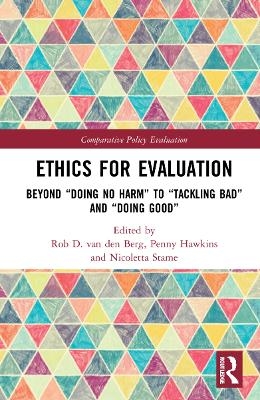
Ethics for Evaluation
Routledge (Verlag)
978-1-032-16143-3 (ISBN)
In Ethics for Evaluation the diverse perspectives on ethical guidance in evaluation are untangled and ordered in a theoretical framework focusing on evaluations doing no harm, tackling bad and doing good.
Divided into four parts a diverse group of subject experts present a practical look at ethics, utilizing practical experience to analyze how ethics have been applied in evaluations and how new approaches can shape the future of ethics. The chapters collectively create a common understanding of the potential role of ethics to infuse policy decisions and stakeholder initiatives with evaluations that provide better insight and potential solutions for problems, going beyond "what works" to what needs to be done and what would help. The methodological scope ranges from working in contexts of fragility, conflict and violence, to participatory and decolonized approaches, including the ethical imperatives posed by global crises such as climate change, inequity and exploitative international relations.
Ethics for Evaluation presents evaluators, commissioners of evaluation, policymakers and practitioners with inspiration for an ethical perspective on how evaluation can contribute towards solving problems. It presents a solid foundation for inclusive terminology and ethics guidance that would be the heart of a global exercise in professionalization of ethical evaluation practice.
Rob D. van den Berg is Visiting Professor at King’s College London, Honorary Associate at the Institute of Development Studies and a member of the Advisory Council of Wilton Park. His advisory work includes the Climate Investment Funds, IFAD and other international organizations. After a career at the Dutch Ministry of Foreign Affairs, where he was Director of the Evaluation Department, he worked as Evaluation Director of the Global Environment Facility at the World Bank. He was President of IDEAS from 2014 to 2020. Rob has published articles and co-edited books on evaluation issues in the light of sustainable development and the need for transformational change. Penny Hawkins is an independent consultant who works with philanthropic, government and private sector organizations to develop strategic and practical impact measurement systems. Prior to this, she held various evaluation leadership positions, including Head of Evaluation at the UK Department for International Development (DFID), the Rockefeller Foundation and the New Zealand Ministry of Foreign Affairs and Trade. Penny is a former Chair of the OECD-DAC Network on Development Evaluation, past President of the Australian Evaluation Society and is a faculty member for the Oxford Impact Measurement Course, Said Business School, University of Oxford. Nicoletta Stame retired as Professor of Social Policy from Sapienza University of Roma. She has a long experience in evaluation, having been the former President of the Italian Evaluation Association and of the European Evaluation Society. She is associate editor of Evaluation, the International Journal of Theory, Research and Practice, and the vice-president of A Colorni-Hirschman International Institute. Nicoletta has published a number of books and articles on the theories and methods of evaluation. In her teaching and writing she aims at promoting democratic evaluation, as a tool for the improvement of society and politics, and an opportunity for supporting responsible practitioners.
Foreword Part 1: Ethical Framework and Guidance 1. A Framework for Approaching Ethics in Evaluation 2. Ethical Guidance: Enabling evaluation’s role in tackling bad and doing good Part 2: Case Studies and Issues Emerging in the Practice of Evaluation 3. Ethics and Evaluation: Ethical issues relating to environmental and social impact evaluations 4. Evaluation and Ethics in Contexts of Fragility, Conflict and Violence 5. Ethics in Evaluation in Resettlement Related Interventions 6. Evidencing the Impact of Complex Interventions: The ethics of achieving transformational change 7. Resilient Evaluators: Characteristics, conditions and prospects Part 3: Ethics in a Changing World 8. Ethical Practice through a Transformative Lens and Methodological Implications in Evaluation 9. The Danger of the Single Story: Evaluation, Ethics and the Global South 10. Evaluation Ethics, Models and Values: The professional imperative 11. Evaluation Ethics in Desperate Times Part 4: The Way Forward 12. Evaluation Contributing to the Common Good and to Tackling Bad: Ethical processes in evaluation
| Erscheinungsdatum | 02.12.2021 |
|---|---|
| Reihe/Serie | Comparative Policy Evaluation |
| Zusatzinfo | 17 Tables, black and white; 7 Line drawings, black and white; 7 Illustrations, black and white |
| Verlagsort | London |
| Sprache | englisch |
| Maße | 152 x 229 mm |
| Gewicht | 453 g |
| Themenwelt | Geisteswissenschaften ► Philosophie ► Ethik |
| Sozialwissenschaften ► Politik / Verwaltung | |
| ISBN-10 | 1-032-16143-4 / 1032161434 |
| ISBN-13 | 978-1-032-16143-3 / 9781032161433 |
| Zustand | Neuware |
| Informationen gemäß Produktsicherheitsverordnung (GPSR) | |
| Haben Sie eine Frage zum Produkt? |
aus dem Bereich


